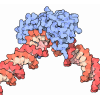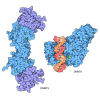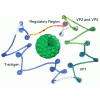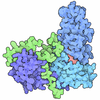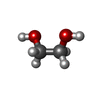[English] 日本語
 Yorodumi
Yorodumi- PDB-3uvw: Crystal Structure of the first bromodomain of human BRD4 in compl... -
+ Open data
Open data
- Basic information
Basic information
| Entry | Database: PDB / ID: 3uvw | ||||||
|---|---|---|---|---|---|---|---|
| Title | Crystal Structure of the first bromodomain of human BRD4 in complex with a diacetylated histone 4 peptide (H4K5acK8ac) | ||||||
 Components Components |
| ||||||
 Keywords Keywords | TRANSCRIPTION/PROTEIN BINDING / Bromodomain / Bromodomain containing protein 4 / CAP / HUNK1 / MCAP / Mitotic chromosome associated protein / peptide complex / Structural Genomics Consortium / SGC / PROTEIN BINDING / TRANSCRIPTION / TRANSCRIPTION-PROTEIN BINDING complex | ||||||
| Function / homology |  Function and homology information Function and homology informationhistone H4K8ac reader activity / histone H3K9ac reader activity / RNA polymerase II C-terminal domain binding / histone H3K27ac reader activity / P-TEFb complex binding / negative regulation of DNA damage checkpoint / histone H4 reader activity / histone H4K5ac reader activity / histone H4K12ac reader activity / host-mediated suppression of viral transcription ...histone H4K8ac reader activity / histone H3K9ac reader activity / RNA polymerase II C-terminal domain binding / histone H3K27ac reader activity / P-TEFb complex binding / negative regulation of DNA damage checkpoint / histone H4 reader activity / histone H4K5ac reader activity / histone H4K12ac reader activity / host-mediated suppression of viral transcription / histone H4K16ac reader activity / positive regulation of G2/M transition of mitotic cell cycle / positive regulation of T-helper 17 cell lineage commitment / negative regulation of megakaryocyte differentiation / protein localization to CENP-A containing chromatin / Replacement of protamines by nucleosomes in the male pronucleus / CENP-A containing nucleosome / Packaging Of Telomere Ends / RNA polymerase II CTD heptapeptide repeat kinase activity / Recognition and association of DNA glycosylase with site containing an affected purine / Cleavage of the damaged purine / Deposition of new CENPA-containing nucleosomes at the centromere / telomere organization / Recognition and association of DNA glycosylase with site containing an affected pyrimidine / Cleavage of the damaged pyrimidine / RNA Polymerase I Promoter Opening / Inhibition of DNA recombination at telomere / Assembly of the ORC complex at the origin of replication / Meiotic synapsis / SUMOylation of chromatin organization proteins / Regulation of endogenous retroelements by the Human Silencing Hub (HUSH) complex / DNA methylation / Condensation of Prophase Chromosomes / condensed nuclear chromosome / Chromatin modifications during the maternal to zygotic transition (MZT) / SIRT1 negatively regulates rRNA expression / HCMV Late Events / ERCC6 (CSB) and EHMT2 (G9a) positively regulate rRNA expression / PRC2 methylates histones and DNA / Regulation of endogenous retroelements by KRAB-ZFP proteins / Defective pyroptosis / transcription coregulator activity / Negative Regulation of CDH1 Gene Transcription / HDACs deacetylate histones / Regulation of endogenous retroelements by Piwi-interacting RNAs (piRNAs) / Nonhomologous End-Joining (NHEJ) / positive regulation of transcription elongation by RNA polymerase II / RNA Polymerase I Promoter Escape / Transcriptional regulation by small RNAs / Formation of the beta-catenin:TCF transactivating complex / Activated PKN1 stimulates transcription of AR (androgen receptor) regulated genes KLK2 and KLK3 / HDMs demethylate histones / RUNX1 regulates genes involved in megakaryocyte differentiation and platelet function / G2/M DNA damage checkpoint / NoRC negatively regulates rRNA expression / B-WICH complex positively regulates rRNA expression / PKMTs methylate histone lysines / DNA Damage/Telomere Stress Induced Senescence / Pre-NOTCH Transcription and Translation / Meiotic recombination / Activation of anterior HOX genes in hindbrain development during early embryogenesis / Transcriptional regulation of granulopoiesis / RMTs methylate histone arginines / HCMV Early Events / p53 binding / structural constituent of chromatin / nucleosome / nucleosome assembly / Recruitment and ATM-mediated phosphorylation of repair and signaling proteins at DNA double strand breaks / HATs acetylate histones / chromosome / RUNX1 regulates transcription of genes involved in differentiation of HSCs / MLL4 and MLL3 complexes regulate expression of PPARG target genes in adipogenesis and hepatic steatosis / chromatin organization / Processing of DNA double-strand break ends / regulation of inflammatory response / Senescence-Associated Secretory Phenotype (SASP) / histone binding / Oxidative Stress Induced Senescence / Estrogen-dependent gene expression / Potential therapeutics for SARS / transcription coactivator activity / chromosome, telomeric region / positive regulation of canonical NF-kappaB signal transduction / transcription cis-regulatory region binding / chromatin remodeling / protein heterodimerization activity / Amyloid fiber formation / protein serine/threonine kinase activity / DNA damage response / chromatin binding / regulation of transcription by RNA polymerase II / positive regulation of DNA-templated transcription / chromatin / enzyme binding / positive regulation of transcription by RNA polymerase II / protein-containing complex / DNA binding / RNA binding / extracellular exosome Similarity search - Function | ||||||
| Biological species |  Homo sapiens (human) Homo sapiens (human) | ||||||
| Method |  X-RAY DIFFRACTION / X-RAY DIFFRACTION /  SYNCHROTRON / SYNCHROTRON /  MOLECULAR REPLACEMENT / MOLECULAR REPLACEMENT /  molecular replacement / Resolution: 1.37 Å molecular replacement / Resolution: 1.37 Å | ||||||
 Authors Authors | Filippakopoulos, P. / Felletar, I. / Picaud, S. / Keates, T. / Muniz, J. / Gileadi, O. / von Delft, F. / Arrowsmith, C.H. / Edwards, A.M. / Weigelt, J. ...Filippakopoulos, P. / Felletar, I. / Picaud, S. / Keates, T. / Muniz, J. / Gileadi, O. / von Delft, F. / Arrowsmith, C.H. / Edwards, A.M. / Weigelt, J. / Bountra, C. / Knapp, S. / Structural Genomics Consortium (SGC) | ||||||
 Citation Citation |  Journal: Cell(Cambridge,Mass.) / Year: 2012 Journal: Cell(Cambridge,Mass.) / Year: 2012Title: Histone recognition and large-scale structural analysis of the human bromodomain family. Authors: Filippakopoulos, P. / Picaud, S. / Mangos, M. / Keates, T. / Lambert, J.P. / Barsyte-Lovejoy, D. / Felletar, I. / Volkmer, R. / Muller, S. / Pawson, T. / Gingras, A.C. / Arrowsmith, C.H. / Knapp, S. | ||||||
| History |
|
- Structure visualization
Structure visualization
| Structure viewer | Molecule:  Molmil Molmil Jmol/JSmol Jmol/JSmol |
|---|
- Downloads & links
Downloads & links
- Download
Download
| PDBx/mmCIF format |  3uvw.cif.gz 3uvw.cif.gz | 83.3 KB | Display |  PDBx/mmCIF format PDBx/mmCIF format |
|---|---|---|---|---|
| PDB format |  pdb3uvw.ent.gz pdb3uvw.ent.gz | 62 KB | Display |  PDB format PDB format |
| PDBx/mmJSON format |  3uvw.json.gz 3uvw.json.gz | Tree view |  PDBx/mmJSON format PDBx/mmJSON format | |
| Others |  Other downloads Other downloads |
-Validation report
| Arichive directory |  https://data.pdbj.org/pub/pdb/validation_reports/uv/3uvw https://data.pdbj.org/pub/pdb/validation_reports/uv/3uvw ftp://data.pdbj.org/pub/pdb/validation_reports/uv/3uvw ftp://data.pdbj.org/pub/pdb/validation_reports/uv/3uvw | HTTPS FTP |
|---|
-Related structure data
| Related structure data | 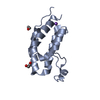 2nxbC 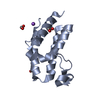 2oo1SC 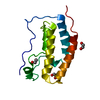 2ossSC 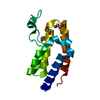 2ouoSC 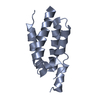 2rfjC 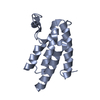 3d7cSC 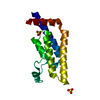 3daiSC 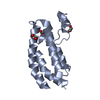 3dwyC 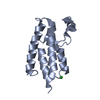 3gg3C 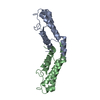 3hmeC 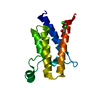 3hmfC 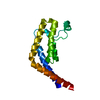 3hmhC 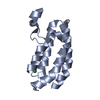 3i3jC 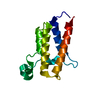 3iu5C 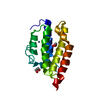 3iu6C 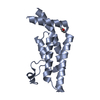 3lxjC 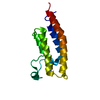 3mb3C 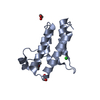 3mb4C 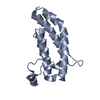 3mqmC 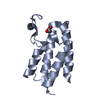 3nxbC 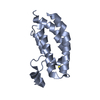 3p1cC 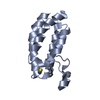 3p1dC 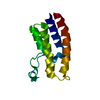 3q2eC 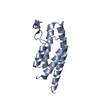 3rcwC 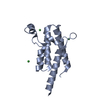 3tlpC 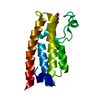 3uv2C 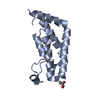 3uv4C 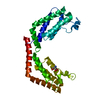 3uv5C 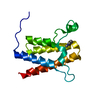 3uvdC 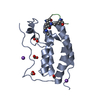 3uvxC 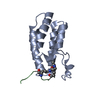 3uvyC 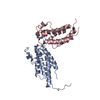 3uw9C 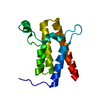 2grcS C: citing same article ( S: Starting model for refinement |
|---|---|
| Similar structure data |
- Links
Links
- Assembly
Assembly
| Deposited unit | 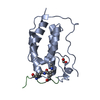
| ||||||||
|---|---|---|---|---|---|---|---|---|---|
| 1 |
| ||||||||
| Unit cell |
| ||||||||
| Details | Monomer |
- Components
Components
| #1: Protein | Mass: 15099.380 Da / Num. of mol.: 1 / Fragment: unp residues 44-168 Source method: isolated from a genetically manipulated source Source: (gene. exp.)  Homo sapiens (human) / Gene: BRD4, HUNK1 / Plasmid: pNIC28-Bsa4 / Production host: Homo sapiens (human) / Gene: BRD4, HUNK1 / Plasmid: pNIC28-Bsa4 / Production host:  |
|---|---|
| #2: Protein/peptide | Mass: 1221.347 Da / Num. of mol.: 1 / Fragment: unp residues 2-12 / Source method: obtained synthetically Details: Human Histone 4 peptide (Uniprot: P62805) residues 1-11 acetylated on K5 and K8 Source: (synth.)  Homo sapiens (human) / References: UniProt: P62805 Homo sapiens (human) / References: UniProt: P62805 |
| #3: Chemical | ChemComp-EDO / |
| #4: Water | ChemComp-HOH / |
| Has protein modification | Y |
-Experimental details
-Experiment
| Experiment | Method:  X-RAY DIFFRACTION / Number of used crystals: 1 X-RAY DIFFRACTION / Number of used crystals: 1 |
|---|
- Sample preparation
Sample preparation
| Crystal | Density Matthews: 1.83 Å3/Da / Density % sol: 32.87 % |
|---|---|
| Crystal grow | Temperature: 278 K / Method: vapor diffusion, sitting drop / pH: 8 Details: 0.1M Tris, 20% MPD, VAPOR DIFFUSION, SITTING DROP, temperature 278K, pH 8.0 |
-Data collection
| Diffraction | Mean temperature: 100 K | ||||||||||||||||||||||||||||||||||||||||||||||||||||||||||||||||||||||||||||||||||||||||
|---|---|---|---|---|---|---|---|---|---|---|---|---|---|---|---|---|---|---|---|---|---|---|---|---|---|---|---|---|---|---|---|---|---|---|---|---|---|---|---|---|---|---|---|---|---|---|---|---|---|---|---|---|---|---|---|---|---|---|---|---|---|---|---|---|---|---|---|---|---|---|---|---|---|---|---|---|---|---|---|---|---|---|---|---|---|---|---|---|---|
| Diffraction source | Source:  SYNCHROTRON / Site: SYNCHROTRON / Site:  Diamond Diamond  / Beamline: I04 / Wavelength: 0.9763 Å / Beamline: I04 / Wavelength: 0.9763 Å | ||||||||||||||||||||||||||||||||||||||||||||||||||||||||||||||||||||||||||||||||||||||||
| Detector | Type: ADSC QUANTUM 315r / Detector: CCD / Date: Oct 17, 2010 | ||||||||||||||||||||||||||||||||||||||||||||||||||||||||||||||||||||||||||||||||||||||||
| Radiation | Protocol: SINGLE WAVELENGTH / Monochromatic (M) / Laue (L): M / Scattering type: x-ray | ||||||||||||||||||||||||||||||||||||||||||||||||||||||||||||||||||||||||||||||||||||||||
| Radiation wavelength | Wavelength: 0.9763 Å / Relative weight: 1 | ||||||||||||||||||||||||||||||||||||||||||||||||||||||||||||||||||||||||||||||||||||||||
| Reflection | Redundancy: 5.5 % / Av σ(I) over netI: 4.3 / Number: 141841 / Rsym value: 0.1 / D res high: 1.37 Å / D res low: 34.59 Å / Num. obs: 25818 / % possible obs: 99.6 | ||||||||||||||||||||||||||||||||||||||||||||||||||||||||||||||||||||||||||||||||||||||||
| Diffraction reflection shell |
| ||||||||||||||||||||||||||||||||||||||||||||||||||||||||||||||||||||||||||||||||||||||||
| Reflection | Resolution: 1.37→37.01 Å / Num. all: 25922 / Num. obs: 25818 / % possible obs: 99.6 % / Redundancy: 5.5 % / Biso Wilson estimate: 11.7 Å2 / Rmerge(I) obs: 0.1 / Rsym value: 0.1 / Net I/σ(I): 10 | ||||||||||||||||||||||||||||||||||||||||||||||||||||||||||||||||||||||||||||||||||||||||
| Reflection shell | Diffraction-ID: 1
|
-Phasing
| Phasing | Method:  molecular replacement molecular replacement | |||||||||
|---|---|---|---|---|---|---|---|---|---|---|
| Phasing MR | Rfactor: 54.84 / Model details: Phaser MODE: MR_AUTO
|
- Processing
Processing
| Software |
| ||||||||||||||||||||||||||||||||||||||||||||||||||||||||||||||||||||||||||||||||||||||||||||||||||||
|---|---|---|---|---|---|---|---|---|---|---|---|---|---|---|---|---|---|---|---|---|---|---|---|---|---|---|---|---|---|---|---|---|---|---|---|---|---|---|---|---|---|---|---|---|---|---|---|---|---|---|---|---|---|---|---|---|---|---|---|---|---|---|---|---|---|---|---|---|---|---|---|---|---|---|---|---|---|---|---|---|---|---|---|---|---|---|---|---|---|---|---|---|---|---|---|---|---|---|---|---|---|
| Refinement | Method to determine structure:  MOLECULAR REPLACEMENT MOLECULAR REPLACEMENTStarting model: Ensemble of PDB Entries 2OSS, 2OUO, 2GRC, 2OO1, 3DAI, 3D7C Resolution: 1.37→37.01 Å / Cor.coef. Fo:Fc: 0.978 / Cor.coef. Fo:Fc free: 0.961 / WRfactor Rfree: 0.1693 / WRfactor Rwork: 0.1235 / Occupancy max: 1 / Occupancy min: 0.5 / FOM work R set: 0.9171 / SU B: 1.864 / SU ML: 0.034 / SU R Cruickshank DPI: 0.0606 / SU Rfree: 0.0575 / Cross valid method: THROUGHOUT / σ(F): 0 / ESU R: 0.061 / ESU R Free: 0.058 / Stereochemistry target values: MAXIMUM LIKELIHOOD Details: HYDROGENS HAVE BEEN ADDED IN THE RIDING POSITIONS U VALUES: REFINED INDIVIDUALLY
| ||||||||||||||||||||||||||||||||||||||||||||||||||||||||||||||||||||||||||||||||||||||||||||||||||||
| Solvent computation | Ion probe radii: 0.8 Å / Shrinkage radii: 0.8 Å / VDW probe radii: 1.4 Å / Solvent model: MASK | ||||||||||||||||||||||||||||||||||||||||||||||||||||||||||||||||||||||||||||||||||||||||||||||||||||
| Displacement parameters | Biso max: 54.55 Å2 / Biso mean: 14.0345 Å2 / Biso min: 4.56 Å2
| ||||||||||||||||||||||||||||||||||||||||||||||||||||||||||||||||||||||||||||||||||||||||||||||||||||
| Refinement step | Cycle: LAST / Resolution: 1.37→37.01 Å
| ||||||||||||||||||||||||||||||||||||||||||||||||||||||||||||||||||||||||||||||||||||||||||||||||||||
| Refine LS restraints |
| ||||||||||||||||||||||||||||||||||||||||||||||||||||||||||||||||||||||||||||||||||||||||||||||||||||
| LS refinement shell | Resolution: 1.37→1.406 Å / Total num. of bins used: 20
|
 Movie
Movie Controller
Controller


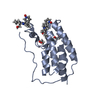

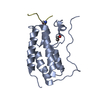
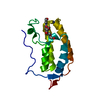
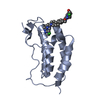
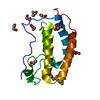
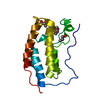
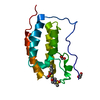
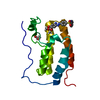
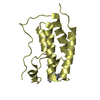
 PDBj
PDBj

